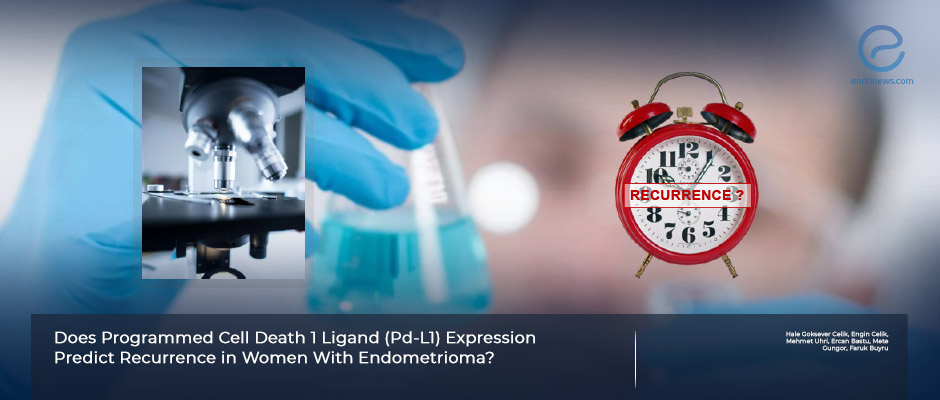Programmed Cell Death 1 Ligand Expression and Endometrioma Recurrence
May 15, 2024
Since endometriosis is an estrogen-dependent disease, it is prone to recurrence, especially during the reproductive age.
Key Points
Highlights:
- Patients with endometriosis should be informed in detail about recurrence and the importance of routine follow-up should be emphasized.
Importance:
- Recurrence of endometriosis cannot yet be predicted by variables such as cyst size, CA125 level and programmed cell death 1 ligand (PD-L1) staining in pathological specimens.
What’s done here?
- This retrospective cohort study was conducted to investigate whether there was a difference in the expression of PD-L1 in the lining of endometrioma in endometriosis patients as predictors for recurrence.
- In addition, the effect of cyst size and serum CA125 level on the expression of PD-L1 protein expression was assessed.
- The intensity of the PD-L1 staining was scored using a semiquantitative system by an experienced gynecological pathologist.
- All demographic and clinical characteristics and the intensity of PD-L1 staining were compared between women with and without recurrence.
- Independent predictors of recurrence including parity, cyst size, serum CA125 level, and PD-L1 staining were determined using logistic regression analysis.
Key results:
- A total of 36 patients who met the eligibility criteria were recruited.
- The mean age and cyst size of the participants were 33.6±7.4 years and 7.6±3.3 cm, respectively.
- No significant difference between the groups was detected in all demographic and clinical characteristics, PD-L1 staining, and the intensity of PD-L1 staining.
- Logistic regression analysis did not reveal the above factors as significant predictors for recurrence.
Strengths and Limitations:
- The main strength of the study was the first study evaluating the association between endometriosis recurrence and PD-L1 expression.
- The retrospective design and limited sample size are the limitations.
Lay Summary
Although there are several medical and surgical management options, endometriosis is highly prone to recurrence. A possible predictor of recurrence would be the quality of life for women with endometriosis. On the other hand, endometriosis is an immunological disease, there are many publications in the literature supporting this situation.
Programmed cell death-1, expressed on the surface of activated T cells, B cells, and other lymphocytes, binds specifically with PD-L1 which has an immunosuppressive role by inhibiting T-cell activity. The interaction between PD-1 and PD-L1 is important for immune responses and peripheral tolerance. Immune system disorders develop because of the suppression of protective T-cell responses under pathological conditions depending on the abnormality of this PD-1 and PD-L1 pathway.
Celik et al., from Acibadem University, Turkey, published a study titled “Does Programmed Cell Death 1 Ligand (Pd-L1) Expression Predict Recurrence in Women with Endometrioma?” in the journal "Cureus". The authors aimed to evaluate whether there was a difference in the expression of PD-L1 in the inner cell lining of endometrioma in endometriosis patients to predict recurrence. They recruited women who underwent endometriosis surgery and performed immunohistochemical staining with PD-L1, to compare the expression of PD-L1 between recurrent and non-recurrent cases. Logistic regression analysis revealed that any variable including parity, cyst size, serum CA125 level, and PD-L1 staining was the recurrence predictor.
“Although we have shown that PD-L1 expression could not be used for the prediction of recurrence, further studies are needed to assess this issue and to guide the development of new immunotherapeutic agents on this basis.” the authors added.
Research Source: https://pubmed.ncbi.nlm.nih.gov/38623124/
endometriosis endometrioma CA125 PD-L1 expression recurrence

